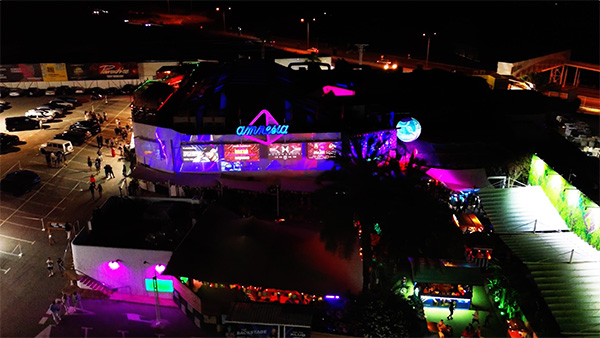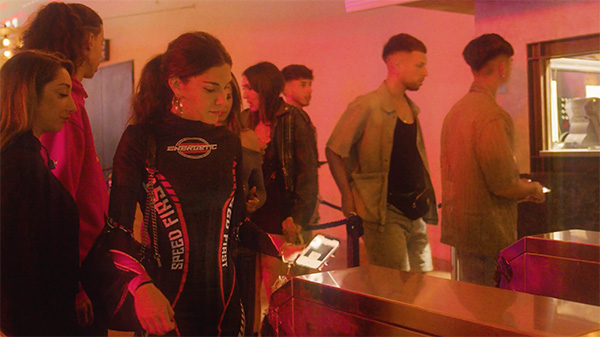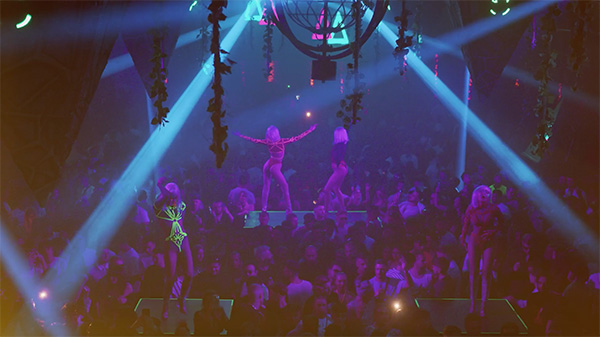- People come to Amnesia because of its legacy
- Digitalisation has been a process
- CM is another department of Amnesia
People come to Amnesia because of its legacy

Amnesia was founded in the 70s by philosopher Antonio Escohotado, who had moved to Ibiza from Madrid. Originally naming it The Workshop of Forgetfulness, his dream was to create a destination on the island where people could come to escape their everyday lives, through music and partying. That dream came true. Within a few years Amnesia was drawing in bohemians from around Europe.
“Antonio wanted to experiment with different atmospheres,” says Bea, Marketing Manager at the club. “People came here to experience things they couldn’t in any other part of the world. It was the door in Spain to these new waves of music.”
In the 1980s, a new wave hit – electronic music. Amnesia, already one of the jewels of Ibiza’s nightlife scene, became the place – witnessing the birth of the ‘Balearic Beat’ and legendary Acid House nights towards the end of the decade.
While the club has expanded its offering in more recent times, collaborating with the likes of Elrow to put on around 160 nights a season, the culture of experimentation and escapism that defined its early years lives on.
“All the nights are completely different from each other. This is something that people really like because it changes the whole atmosphere of the club,” says Bea.
“The minute people are coming through the door, they feel free,” adds Agnieszka, Amnesia’s Ad Manager and Data Analyst. “We have a huge variety of DJs, a huge variety of fiestas and parties. Whatever you’re into, whoever you are, you come in and find yourself here.”
“We all have that same passion, from the owner to the last person that leaves this building,” adds Agnieszka. “It connects us all, within the team, on the dancefloor, it’s that one beat that we all have for this place.”
Digitalisation has been a process
For all that legacy, Amnesia has had to adapt to the digital world like any other business.“Digitalisation has been a process in the company and also the marketing team,” says Bea. “We’ve had to transform some of the systems and processes and embrace new technologies.”
To cement the club’s global reputation and engage fans, Amnesia have worked hard to build their social reach. The marketing team work around-the-clock to capture live content to “make the Amnesia nights go around the world” and delight their near 800,000-strong Instagram following.
Capturing the spirit of an offline experience online is something a lot of hospitality businesses struggle to do. Where Amnesia has succeeded is through replicating the energy of its club nights across its digital channels, consolidating offline and online into one seamless, multi-sensory experience.
Let’s take the website, rebranded and rebuilt earlier this year, as an example. Landing on the homepage, you get a sense of what it must be like to step onto the Amnesia dancefloor. There are gaudy colours, shapes that melt into one another as you hover over them, and bold statements that flash up and disappear in the blink of an eye. In the centre of the screen a video offers fractured glimpses of the club, spinning the viewer round into different rooms. It’s disconcerting and probably breaks a few design rules but the impression it leaves is clear: Amnesia is unusual, bold and an experience not to be missed.
CM is another department of Amnesia
In 2022 Amnesia began working with CM.com to evolve another critical area of the business – ticketing.
“We used to have paper tickets and we distributed them to the island in a manual way,” explains Aleix, Head of Sales. “After that we started to sell tickets on our website. We had our own system which was very, very simple.
“Now with CM, we have a lot of new things that our system couldn’t give us before. We have all the new tools and things that we didn’t have before. It’s given us a lot of new horizons for how to manage the club, how to manage the brand.”

Those new horizons include the ability to stay in touch with fans all year-round through CM’s built-in email and SMS marketing tools, which they use to tease new nights and segment audiences by country to create more personalised flows. Another step forward has been including merch as an add-on in the checkout process for buying tickets, which attendees can collect when they arrive. The online ticket shop itself is fully branded and customised according to the specific night visitors are looking to attend.
Crucially, with CM.com, Amnesia retain control of their data (unlike many other ticketing platforms, who make it difficult to extract) and use it to stay ahead of the game.
“Before, when we opened the doors during the day for every event, we didn't know how many people we should expect to come to the club,” says Aleix. “The reporting tools and real-time information we get now has helped us to find better solutions and take better decisions for the global management of the brand.”
So far the partnership has yielded two bumper seasons of increased ticket sales with more success to come as the two companies work closely on honing the experience for fans.
“The most important thing that we need from our ticketing partner during high-season, peak-season, is that constant contact. Full support during the day, all the answers that we need in a short time,” says Aleix. “CM.com is another department of Amnesia. They are out of the club. But the level of contact we have with them every day makes us feel like they are inside the company.”
Agnieszka adds: “All of the marketing tools help to add to whatever is already here, that true living organism.”

